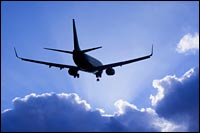Peter Madden, chief executive of Forum for the Future, writes a monthly column for Gristmill on sustainability in the U.K. and Europe.
 The Bishop of London recently proclaimed that flying on holiday is a sin, a view that seems increasingly to be shared by greens in the U.K.
The Bishop of London recently proclaimed that flying on holiday is a sin, a view that seems increasingly to be shared by greens in the U.K.
Our environment minister, David Miliband, castigated Prince Charles for flying to America to receive an award, suggesting that he should have collected it via video-link. Mayer Hillman, author of How We Can Save the Planet and one of the more rigorous of our green thinkers, wants us to "drastically reduce or stop flying."
This of course raises a problem of public acceptability; for most people, flying is still something to aspire to.
It also raises some particular problems for environmentalists. Global travel and networking are important both to how we frame our challenges and how we resolve them.
Many people I know became interested in sustainable development through experiencing other cultures and places, often in different parts of the world. I myself spent my 20s working on poverty and development issues in Africa, Asia, and Latin America, and this is an important part of who I am. George Monbiot rails against flying in his excellent book Heat. Yet, as he himself admits, his overseas experience as a young anthropologist in the Amazon helped to define him and give him the powerful voice he has today. Firsthand experience of the beauty and the destruction of the natural world has galvanized countless people into action.
Young people in the U.K. certainly want to experience the world. Forum for the Future recently conducted the largest-ever survey in the U.K. of what young people want from their future. Fifty-five thousand teenagers responded. Unsurprisingly, this generation is very environmentally aware. Ninety-one percent think climate change will be hitting hard in 20 years. Over 60 percent say they sometimes walk or cycle instead of travelling by car for environmental reasons, and 40 percent had bought locally produced food instead of imports. However, only 4 percent said that they had consciously decided not to take an air flight for environmental reasons. They seem willing to change their behaviors on almost every aspect of climate change except flying.
The environmental movement is very much an international movement. Problems such as climate change are clearly global ones. So how do we deal with the need for global networking and interventions to solve global problems? It is quite tricky to decide in advance whether an international negotiation — such as those held in Rio or Kyoto — is worth going to. There must be legitimate arguments that staff of development and human-rights organizations need to get on a plane to do their jobs. Who is to make these moral and value judgements?
So, we want to fly to save the planet, but cannot all do so without destroying the planet. Is there an answer?
Unlike with car travel, there are no easy technological solutions. Major breakthroughs in aviation technology would appear to be at least 20 years off.
We should certainly make flying more expensive by doing more to internalize the costs, through emissions-trading schemes, taxing aviation fuel, and auctioning takeoff and landing slots.
We also need to do a lot more to make the alternatives truly attractive. Train travel could replace a huge number of short-haul flights. And what about removing the need to travel at all? The things that allow us to communicate without moving could also be vastly improved. I recently saw some cutting-edge video-conferencing technology called Halo that Hewlett-Packard has developed. It is not cheap, but it does show what can be done. However, electronic communication is unlikely to replace the desire to experience other places and cultures firsthand.
Of course, we should buy good quality offsets for those flights we have to take. But again, offset should always be the last choice in the carbon-management hierarchy.
So, there are no easy answers to this one. If the growth in flying continues on its present trajectory, it will wipe out many of the other carbon savings we will struggle so hard to make.
Monbiot suggests that we should reserve the few flights we do take for "love miles." I quite like this concept because my family and friends are scattered across the globe and I do want to be able to go very occasionally to weddings, funerals, and so on. I also believe that the impact of our work can still justify the occasional flight.
We will, however, have to be more discerning about flying. Tackling climate change means restricting the growth of aviation and making flying something precious again. Should we, for example, prioritize flying people rather than freight, or save slots for long-haul rather than short-haul?
We will also want to make the journey itself a greater part of the experience. When we vacation, we should slow down and enjoy the ride. That means you guys in the U.S. might have to start campaigning for longer holidays. I think your average paid holiday is around 13 days a year. In the European Union, we get more than double that!
 The Bishop of London recently
The Bishop of London recently 

